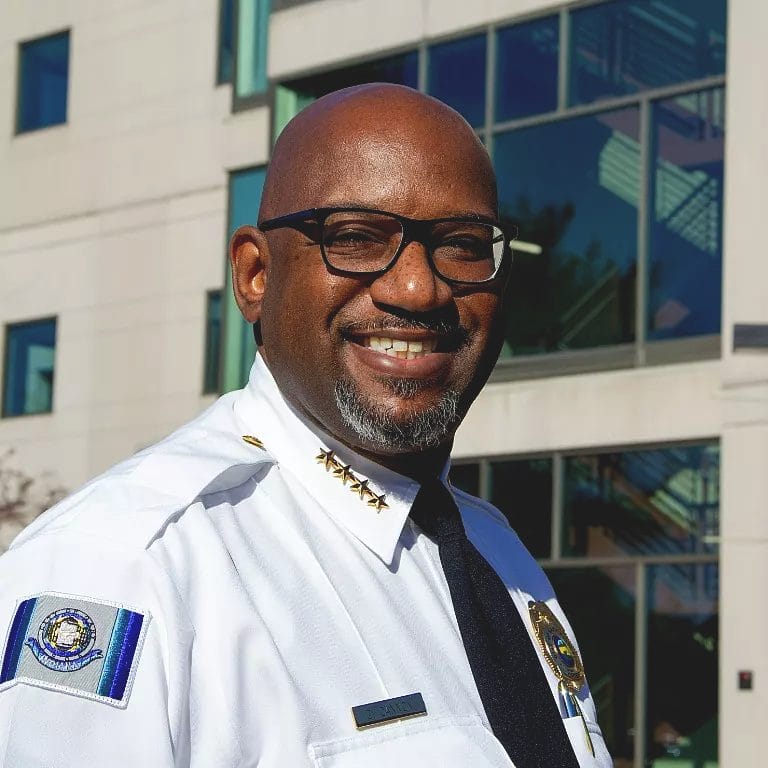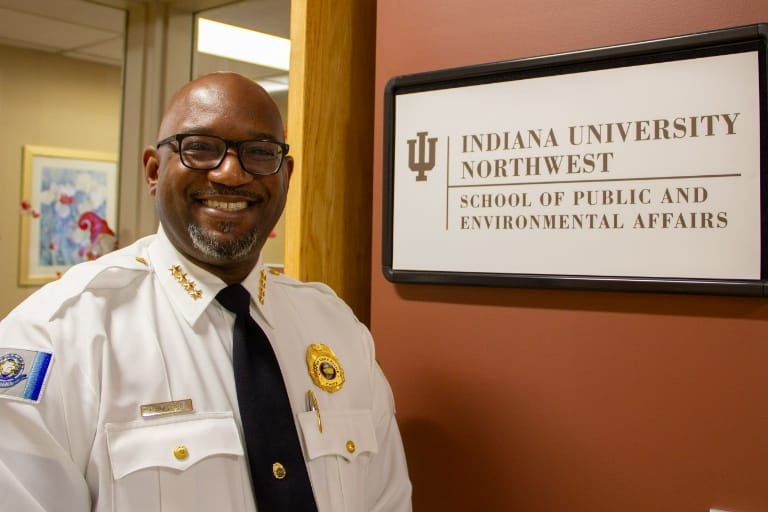Cannon received bachelor’s and master’s degrees in the School of Public and Environmental Affairs
Derrick Cannon didn’t have to go far to achieve what he wanted in life.
Born in Gary, Indiana, Cannon used to ride his bike down Broadway and graduated from William A. Wirt High School. Education wasn’t his focus after high school, neither was spending 25 years in the City of Gary Police Department after joining as a volunteer.
But things don’t always go as planned. Years into his career, Cannon found a community-facing university in the same city that would put him in a leadership position to implement community-based policing.
“I feel like I’m very well rooted in this community,” Cannon said. “I want to be a police officer on my block where someone says, ‘Oh, I know him.’ We should be able to have those things in our community.”
Cannon’s path to becoming the City of Gary’s Chief of Police in Jan. 2024 by Mayor Eddie Melton wasn’t linear, though. Neither was his educational journey.
Luckily, there isn’t such a thing as an atypical educational journey at Indiana University Northwest. It’s a place where thousands have found an affordable, flexible place to grow in their careers while continuing to work.
A full-time cop decides to go back to school
Cannon didn’t grow up dreaming of being a police officer.
“We had a certain respect level for law enforcement,” Cannon said. “As I got older, the dynamics of how America was moving and how law enforcement was being viewed in the media, I wasn’t necessarily such a fan of law enforcement myself.”
One day, working as a security officer, Cannon met someone who was an auxiliary — or volunteer — police officer for the City of Gary. The program intrigued Cannon, so he applied, was accepted and started training.
He put all his efforts into law enforcement. He was hired as a patrolman three years after starting as a volunteer and quickly moved up in rank. He tried to get his degree along the way, but it never worked out.
It wasn’t until 2012, when Cannon was a sergeant attending Northwestern University’s Center for Public Safety program, that he rethought his education.
“I didn’t necessarily start my education program and then get a job,” Cannon said. “I had a job and I wanted to accent my job by starting my educational pursuits.”
Whether starting out of high school or coming back, IU Northwest has a diverse population of students with different goals.
Cannon transferred credits from Northwestern to IU Northwest, began his degree in 2014 and graduated in 2017 with a Bachelor of Science in Public Affairs and a Concentration in Management.
The next year, he was admitted to the highly selective FBI National Academy in Quantico, Virginia, where he lived for three months and took classes in psychological leadership, organizational change, law enforcement studies and more. He traveled to Washington D.C., New York and Philadelphia and saw how larger agencies handled different situations.

It was a rewarding experience, eventually leading to him obtaining commissions with the Bureau of Alcohol, Tobacco, Firearms and Explosives (ATF) and Food and Drug Administration (FDA) while remaining an officer in Gary. It also allowed him to transfer credits to IU Northwest and he received his Master of Public Affairs with a concentration in Criminal Justice in 2021.
Furthering his education allowed Cannon to move up in the police department to lieutenant, captain and eventually chief.
How an IU Northwest education advanced a career
There were times Cannon felt he’d hit a plateau in his career. As someone who wants to make the most of every situation, that didn’t sit well with him.
“With those plateaus, I thought, ‘Where can I go from here?’” Cannon said.
Earlier in his career, Cannon went to IU Northwest. When he became serious about advancing in law enforcement, going back was an obvious choice. Its location and footprint in the community were unbeatable and the curriculum was attractive for someone in criminal justice.
So, Cannon went back. He grinded, taking classes in the School of Public and Environmental Affairs (SPEA), sometimes in his police uniform when he didn’t have time to change after work. It wasn’t easy balancing his professional, personal and educational pursuits, but he said the faculty was understanding, helping him succeed even when he had to take a full course load his final semester.
Cannon also said the classes made him a better police officer.
One class, taught by SPEA Associate Professor Monica Solinas-Saunders, was made up of IU students and incarcerated individuals in the work-release program in Lake County.
They gathered, talking about contemporary issues in society, the judicial system and more. Cannon saw and heard how his peers and those incarcerated felt about law enforcement. He didn’t reveal he was a police officer until the end of the semester, giving him a truly authentic perspective.
“Being a member in the large criminal justice system, the class gave me a very personal look at how some of these things are affected down the line and how I can help,” Cannon said. “The class was very impactful. I still keep up with all my classmates.”
Using the local university to change a community
Today, walking around IU Northwest’s campus in his police uniform, Cannon can’t help but smile.
Outside the SPEA offices, his name’s enshrined on a plaque for being a SPEA alumnus who provided exemplary public service. Inside the offices, he remembers the conversations he had with SPEA Assistant to the Dean Suzanne Greene, who he credits for helping him navigate his higher education journey.
Cannon didn’t want to be a police officer, but he wanted to make a difference in his hometown. IU Northwest helped put him in a position to do so.
“How can you change any situation unless you’re ingrained in it, and you have a choice in the matter?” Cannon said.
In his new role, Cannon is focused on recruitment and retention, implementing changes in training, communicating with the public and serving them.
Early in his tenure as Police Chief, he knows there’s work to do. But being a Gary resident, improving the quality of life in the community is personal. Thanks to some of the eye-opening experiences he had pursuing higher education, he’s ready to make changes.
“I’m happy to be an IUN alumnus,” he said. “I knew that I had to be well-rounded in certain areas to be able to serve my community at the level that I wanted to serve it on. IUN fit right into that scope.”






